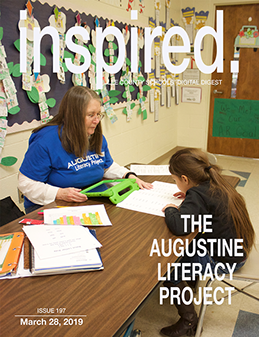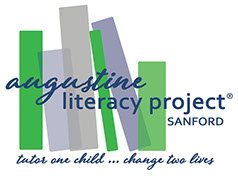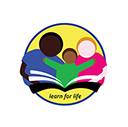


Learn about our literacy services for school age children and adults.
Literacy allows parents to read to their children.
Our goal is to improve the literacy abilities of low-income students and adults in Lee County.
Welcome to
Lee County Literacy Council
The Lee County Literacy Council wants to help you and your family learn for life. We improve the reading, writing, spelling, and comprehension of children and adults by trained volunteer tutors who provide research-based literacy instruction in a nurturing environment. < LEARN MORE >
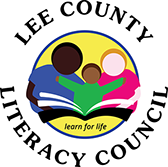
Programs
Select a program below to learn more.
Learn for life. Once you learn to read, you will forever be free. Literacy allows parents to read to their children. Improved literacy skills benefit not only the struggling reader, but everyone in our community regardless of age, race, gender, or background. Literacy and English language proficiency, in reading, writing and arithmetic are tools that help people move out of poverty and get better-paying jobs to support their families. Literacy improves our community, our economy, and individual lives. Lee County Literacy Council provides learning resources for all Tudors and Students.
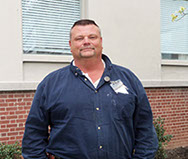
Adult Education
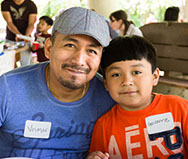
English As A Second Language

Children Services
lee county literacy council inc
NEWS
Serving Adults and Children
Keep up to date on the latest news and Information to all students and tutors. Learn about what is the happening in the community and all programs involved with Lee County Literacy Council.
IN THE NEWS:
Click here to read this week's edition of our award-winning digital digest - INSPIRED.
Inspired is a digital digest published each week during the academic year by Lee County Schools to highlight accomplishments of students, faculty and staff.
All Inspired articles are available online at www.lee.k12.nc.us, and if you have any story ideas, please send them to inspired@lee.k12.nc.us.
INSPIRED.
The Augustine Literacy Project
For Barbara Yuskevich, literacy is a passion.
Yuskevich is the founder of the all-volunteer Lee County Literacy Council, which makes its primary goal to “improve the reading, writing, spelling and comprehension of children and adults” through “research-based literacy instruction in a nurturing environment.”
And nowhere is that goal – and Yuskevich's passion for literacy – more evident than at B.T. Bullock Elementary School in Sanford, where the Literacy Council's Augustine Literacy Project is at work to help first and second graders improve their reading skills to at or even above grade level.
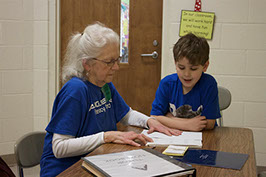
An Augustine tutor helps a student with his reading.
“The Augustine Project came from Chapel Hill, where there was a parent who couldn't get her child properly educated because she was dyslexic,” Yuskevich said. “So she began a tutoring project in Chapel Hill that eventually became what we're doing now.”
Through the Augustine Literacy Project, 15 tutors – each of whom has 30 hours of training before ever setting foot in a classroom – work one-on-one with first and second graders at Bullock who have been identified through state-mandated mClass assessments as being below reading level for their grade. Because first graders are expected to grow a whopping six reading levels through the course of the year, the program provides an often-necessary service to many, and the research-based, phonetic-structured program has been proven to work.
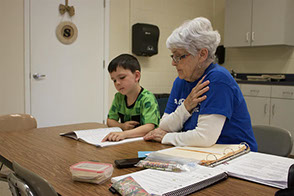
An Augustine tutor helps a student with his reading.
“We do a lot of syllable work, teaching them how to break words down into syllables and then put them back together,” Yuskevich explained. “One key thing is we have the children tap the sounds out with their fingers, and then say the whole word, so they're acting out something physical while they're doing the spelling.”
Bullock Principal Stefanie Clarke said the Augustine Literacy Project, under which the students receive the tutoring twice each week, is important for many reasons, but one of the biggest ones is that it doesn't require any additional work for the classroom teachers.
“It's such a luxury for the teachers to have,” she said. “Barbara and her tutors do all the hard work – I just open the doors and ask them to come in. Her team is just the sweetest, kindest group of people. They're all sort of grandparent age, and I think there's something really sweet and special about that connection.”
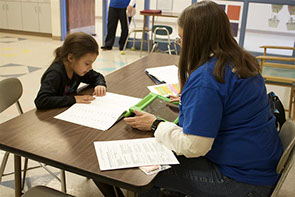
An Augustine tutor times how long it takes a student to read specific words.
Because each child starts at a different point, the tutoring is highly customized, always positive – there's no red ink, for example, which emphasizes confidence building and allowing children to make mistakes – and re-assessments are frequent.
“It's a constant litmus of how the students are growing and progressing,” Clarke said.
As such, it's not uncommon to see students begin the program far below grade level in reading skills and advance quickly – sometimes going up as many as four or five levels in a matter of months.
“We've seen some really incredible changes,” Yuskevich said. “And it happens again and again and again. The staff here has been phenomenal, and (Clarke) really has a heart for the kids.”
Yuskevich said the program is always looking for volunteer tutors, and those interested in becoming a part of the program can visit the Lee County Literacy Council’s website at www.LeeCountyLiteracyNC.org or call 919-708-2178.
___________________________
Training Dates for the Augustine Literacy Project® Sanford
We are offering training for the Augustine Literacy Project® Sanford please contact our office for details St. Thomas Episcopal Church located at 312 N. Steele Street, Sanford, NC 27330. With interest call 919-708-2178 or email children@leecountyliteracync.org.
Our mission is to improve the reading, writing and spelling abilities of low-income children and teens who struggle with literacy skills. We provide ongoing, hands-on, and accessible tutoring for our students and the resources and training needed for its volunteers.
We train and support volunteer tutors who provide free, long term, one-to-one instruction using the Orton-Gillingham approach and Wilson Reading System® materials. Our tutors work with students in the Sanford area.
Serving school age children who qualify
• Low-income receiving free or reduced lunches at school
• 1-2 years behind in reading, writing or spelling
• Receiving other Social Service such as Medicaid, WIC, or housing
___________________________
IN THE NEWS:
Literacy council helping children, adults alike
NOAH GRANT NGRANT@SANFORDHERALD.COM
Jan 25, 2018
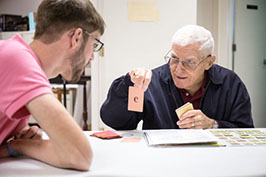
Ray Hyer, right, assists Tyler Perdew with his vowel sounds at their Thursday tutoring session. Hyer said they have made progress over the duo's 83 meetings.
Matt Monarca | The Sanford Herald
Tyler Perdew wants his driver's license, and the reading portion of the test is the only thing standing in his way.
Perdew has a learning disability, which has impacted his ability to read and write. That’s where Lee County Literacy Council Inc. comes in. The council aims to improve the reading and writing of adults and children through tutoring sessions.
Dr. Ray Hyer, a former teacher, serves as Perdew’s tutor and Thursday’s session marked their 83rd together.
“We’ve made progress. We really have but it’s really tough. It’s really hard,” Hyer said. “This is what you call a learning disability. It’s certain sounds and certain words he has different ways of visualizing and that kind of thing. You’d be surprised. This is a pretty common kind of disability.”
Billie Kay, Perdew’s support worker, accompanies Perdew to the sessions and helps him outside of tutoring. She’s seen the positive effect the progress has had on Perdew’s demeanor.
“His confidence has boosted a lot in the last year too because we’re out in town and before he would say, ‘What does that say? Read it to me.’ she said. “Now he’s just shooting out words, reading signs and reading to me.”
The council is the brainchild of Barbara Yuskevich, who has a background in early childhood education. Yuskevich’s daughter has a learning disability, which has pushed her to help more. This help began with the Augustine Literacy Project (ALP), which assists children who are low income, receive free or reduced lunch or other social services and are 1-2 years behind in reading.
St. Thomas Episcopal Church, Yuskevich and Hyer’s home church, became a ALP replication site in 2011. The program has 11 tutors that assist students each Monday and Wednesday at B.T. Bullock Elementary School.
The council uses the Orton-Gillingham approach in sessions, which is a research-based program used in one-on-one environments. For children and adults, Yuskevich aims for two sessions a week that can be 45-60 minutes. The teaching starts with listening and grasping sounds before finally progressing to writing full sentences.
The idea for an adult arm of the council came when Yuskevich received a call from Project Safe Neighborhoods, an initiative that aims to reduce gun violence in the U.S. Yuskevich learned that these potential offenders couldn’t read or write well enough to fill out a job application or even earn a GED.
Yuskevich referenced a gap that exists between low literacy levels and the community college level. She said Central Carolina Community College would like entrants to be at a sixth-grade level and that the council can help get them there.
The council works through volunteer tutors, such as Hyer, who complete the relevant training in order to begin helping. The training usually lasts one week, runs from 9 a.m.-3 p.m. and encompasses how to write lesson plans, carry out the plan and assess the student. Along with 11 student tutors, Yuskevich has three trained adult tutors that can help high school dropouts, offenders on probation, people with learning disabilities and more.
Yuskevich said adults can function without being completely literate, but that they can only go so far in life without a grasp of reading or writing. Bill Horner III, Lee County Education Foundation chairman, has worked with several literacy projects in the past, but described the council as the first group that “really has legs,” particularly through Yuskevich’s work.
“There’s this vacuum that’s been created by people who fall through the cracks because they fail in school for whatever different reasons and we’re stepping into that void to give these people a chance,” Horner said.
Horner said literacy is important from a economic development standpoint, because those who struggle can’t progress through jobs as easily.
“To me, not being able to read is like only being able to see the world in black and white,” Horner said. “You get by, you can survive, but you miss the amazing colors that help make life spectacular.”
For more than 25 years, Horner worked with the Reading is Fundamental of Lee County program, which was shut down two years ago. He decided to divide the remaining funds, about $15,000 total, between the foundation and the council.
The council is still in the beginning stage, particularly in the adult program. There’s a need, with ProLiteracy reporting more than 36 million adults in the U.S. who cannot read, write or do basic math above a third-grade level.
For more information about the program or tutoring, contact the council at 919-708-2178 or visit the website LeeCountyLiteracyNC.org.
Reach Staff Writer Noah Grant at 919-718-1229 and on Twitter at @NoahGrantHerald.
Click below to learn more
If I Know Someone Who Needs Help, How Can I Help Them?
Do You Know Someone Who Struggles With Reading?
Why Does Our Community Need a Literacy Program?
Sobering US Literacy Facts
• 36 million adults cannot read, write, or do math above 3rd grade level
• Children whose parents have low literacy levels have a 72% chance of being at the lowest level themselves (poor grades, display behavioral problems, high absentee rates, repeat grades, or drop out)
• 1 in 6 students drop out of high school a year
• 75% of inmates did not complete high school and are classified as low literacy (ProLiteracy®)
^ RETURN TO TOP OF PAGE ^
Lee County Literacy Council Inc
312 N. Steele Street
Sanford, NC 27330

